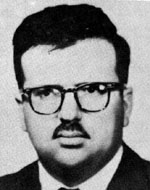Schwartz Abraham, Dr.
An only son to his parents, Simcha and Esther. He was born on July 15, 1935 in the city of Komron, Hungary. The family immigrated to Israel in 1937. Avraham attended the Mizrahi School in Rehovot and the Tachkemoni School in Tel Aviv. Due to work difficulties, the family moved to Haifa, where he continued to study at the Mizrachi school. When he was ten years old, he was orphaned by his mother and the disaster affected him greatly. His father then handed him over to the children’s home in the Yavneh group, where he completed his elementary studies. Afterward, he studied at Midreshet Noam in Pardes Hanna and was one of the most talented students there, and also graduated high school successfully. He was fearful of Heaven and determined time for Torah. When his time for enlistment in the IDF came, his father raised the idea that perhaps he should be postponed because he was an only child – and to continue his studies, but Avraham Yashra was honest and did not want to accept any proposal to postpone his enlistment and service. “He was drafted in July 1953, and after completing his regular service he began to study physical chemistry at the Hebrew University of Jerusalem until he graduated from the Hebrew University of Jerusalem. He received his PhD from the Hebrew Technion in Haifa and then completed his studies for one year At the University of Buffalo in the United States and worked at the Oak-Ridge Laboratories in Tennessee for three years, where he and his wife and eldest daughter were born, and a second child was born, and when the eldest daughter’s education problems arose, Avraham and his wife concluded that educating their children And returned to Israel in 1966. In 1966, he returned from the United States to the Atomic Energy Laboratory in Nahal Sorek, where he was one of the senior scientists, and served as a departmental manager, who immediately became one of the most talented and promising people. Active, independent in thought, with original ideas and a strong desire to advance and advance; His personality was pleasant and appealing, his conversation stimulating and interesting. He would publish professional articles. Before the Six-Day War, he received a call-up and took part in a battle that took place at the Al-Kubba outpost on the first day of the fighting, on which he was wounded and on Tuesday, June 11, 1967. He died of his wounds and left a wife and three children. He was brought to eternal rest in the military cemetery in Kiryat Shaul.
